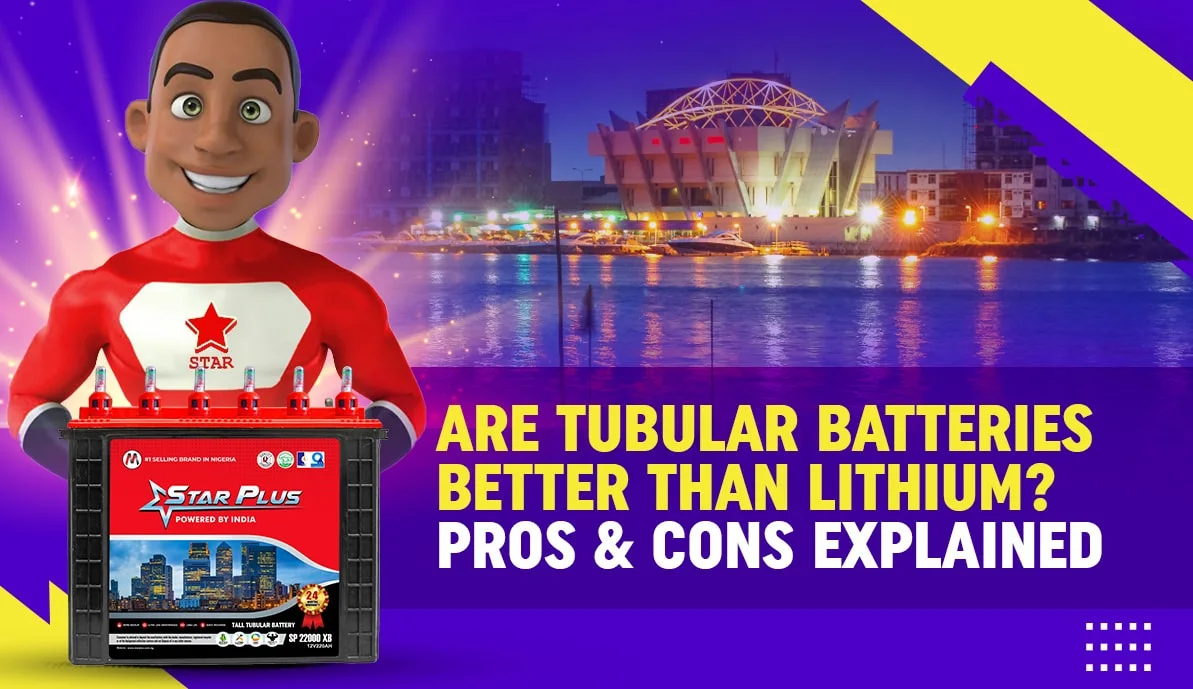Nigeria’s energy challenges have increased the demand for power backup. In today’s fast-paced world, the demand for dependable and effective energy storage solutions has increased. Apart from storing energy, the need for a consistent power supply has gradually enhanced, influencing companies to manufacture the best inverters.
Tubular Batteries and Lithium-Ion Batteries are two primary types widely used in Nigerian homes and offices. But which one is better? Or are they both the same?
Here at Star Plus Battery, we can provide you with a detailed explanation of both battery types, their advantages and disadvantages, and their competencies. Check out this blog to learn more.
Composition of Tubular Inverter Battery
Concept
Tubular Batteries are a type of deep-cycle lead-acid battery characterised by their unique design, which features tubular positive plates. The positive plates of a tubular battery are constructed with a lattice-like tubular design, offering improved durability compared to flat-plate lead-acid batteries. Tubular batteries have a positive plate nestled with a tube wrapped in cloth, which holds its electric power.
The following are the significant advantages and disadvantages of tubular inverter batteries:
Pros
- Tubular inverter batteries have a longer lifespan.
- They have a higher capacity for storing energy.
- The plates of tubular batteries have more excellent resistance against corrosion and degradation.
- They can withstand deep discharge cycles.
- Tubular batteries have lower maintenance costs compared to other inverter batteries.
Cons
- Initially, the cost of tubular inverter batteries can be higher than that of other inverter batteries.
- Tubular batteries require periodic topping up with distilled water.
- It might not be completely maintenance-free.
Composition of Lithium-Ion Inverter Battery
Concept
A lithium-ion battery is a rechargeable battery that stores energy by moving lithium ions between anode and cathode electrodes. This is a popular choice for portable electronics and electric vehicles. Due to its high energy density and rechargeability, it is widely used for energy storage and transmission purposes.
Pros
- The lifecycle of lithium-ion batteries is more than that of lead-acid batteries.
- Lithium-ion batteries are of zero or low maintenance compared to lead-acid batteries.
- Lithium-ion batteries are fast-charging batteries and thereby can save energy.
- These batteries are lightweight.
- They take up less space and do not emit any harmful gases.
- Lithium-ion batteries have a deeper depth of discharge.
Cons
- Lithium-ion batteries tend to overheat and can explode.
- These batteries are highly reactive and can, in extreme situations, cause fire outbreaks.
- Requires specific storage and security for proper management.
Want to Buy Tubular Inverter Battery for Your Home and Office?
Tubular Inverter Batteries vs. Lithium-Ion Inverter Batteries
If you are wondering which of the two is the best, let’s evaluate through a comparative analysis of tubular battery vs. lithium battery.
1. Weight and Portability
If you are looking for portability, then lithium-ion batteries are lightweight and portable. Even though a tubular battery has the same capacity, it might weigh more than Lithium-ion batteries. Nigerians living in compact spaces might feel it’s better to get a lithium-ion battery to fit within their household.
2. Maximising of Usable Power
Tubular batteries can maximise usable power compared with lithium-ion batteries. In case of high-energy needs, tubular inverter batteries offer a more significant and consistent power supply. Even though lithium-ion batteries can function well, their tubular counterparts are sturdier and can provide uninterrupted support.
3. Charging time
Lithium-ion batteries require significantly less charging time than tubular inverter batteries. For instance, if a lithium battery takes 4 to 5 hours to charge, a tubular battery takes 7 to 8 hours to charge fully.
4. Charging styles
Tubular batteries are charged in four stages, starting from bulk stages to absorption, float, and equalisation. Compared to this, lithium batteries have a less complex charging technique. However, tubular batteries’ complex charging styles contribute to their sturdier performance.
5. Efficiency
Lithium batteries are ideal for systems that require frequent and long-term use, especially in solar-powered installations. Tubular inverter batteries are similarly efficient for frequent usage and rapid recharging.
6. Maintenance
Tubular inverter batteries generally require regular maintenance compared to lithium-ion batteries. From topping up distilled water to cleaning corroded terminals, tubular batteries require comprehensive care. On the other hand, lithium batteries are known to be maintenance-free; however, they can be highly vulnerable in nature.
Conclusion
Both tubular and lithium batteries can meet specific power needs. You should properly analyse your total power requirements before purchasing any particular inverter battery.
At Star Plus Battery, we can provide premium-quality inverter batteries for homes and offices so that you and your loved ones can live without tension.



0 Comments